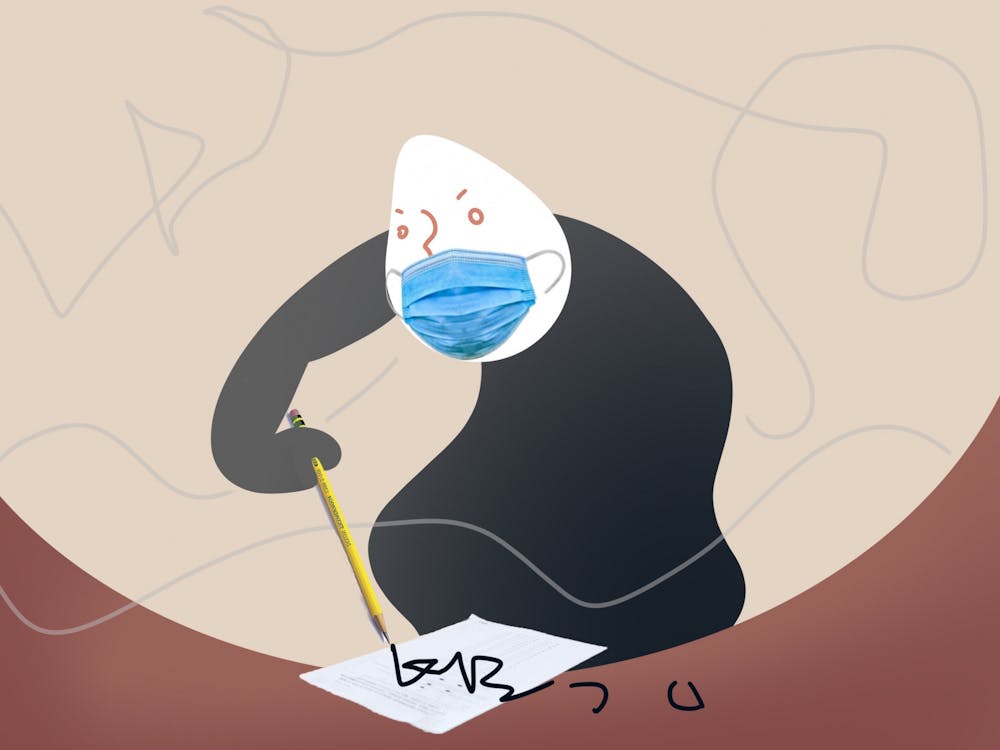Two professors are co-teaching a new course this fall focused on understanding the many non-biomedical consequences of COVID-19. The course, UNIV 450: “We live in interesting times: The long reach of the COVID-19 pandemic,” combines the expertise of both Professor of Economics Emily Oster and Professor of Ecology, Evolution and Organismal Biology Daniel Weinreich, as well as over 20 guest speakers.
Oster, who was a prominent voice throughout the pandemic advocating for reopening schools, and Weinreich, who specializes in evolutionary and population genetics, created the course in order to take a multifaceted approach to studying the pandemic, they said.
Oster said that incorporating a wide range of different subjects — from public health and biology to sociology and classics — within one course creates a unique learning environment.
“What is very exciting about this class is that it is really something that you can only do at Brown,” she said. “You can only do it at a place where not only are students interested in interdisciplinary engagement, but the faculty are willing to come and give a lecture in a class that they are not teaching.”
“I don't regard this class as a chronicle of this pandemic,” Weinreich said, “but rather as a lens to learn about the way society works and things we do out of habit that were disrupted or amplified.”
Weinreich said he first had the idea for the class last fall. When he pitched the concept to a group of faculty members, Oster told him she was interested in helping develop the idea. “We were both really excited about the material,” Weinreich said. “It's turning out to be a really effective collaboration.”
Over the semester, Oster and Weinrich will teach five lectures between them, but guest lectures make up the rest of the course. According to the syllabus, the class includes lecturers ranging from President Christina Paxson P’19, who discussed the University’s response to the pandemic, to professors of classics and Italian studies who lectured on the history of plagues in ancient and medieval Europe. Megan Ranney, academic dean of the School of Public Health and another prominent voice through the pandemic, will lecture in December.
Other lecture topics have included the response to the Ebola crisis and a view of different governmental responses to COVID-19 from Scott Rivkees, professor of the practice at the School of Public Health who formerly served as Florida’s surgeon general.
Because the pandemic has affected so many aspects of society, Weinreich said he wanted to include a wide variety of expertise from many different fields of study.
“There's no way I could develop a deep understanding of the content in this course in a way that would be useful to students,” he said. Weinrich added that finding faculty to participate in the lectures was a very easy process.
One of Oster’s goals for the course is to help students understand the breadth of the scholarship at the University surrounding the pandemic, she said.
Both Oster and Weinreich felt the course could not fall under the label of a single department — leading to the University Courses coding. “It felt really constraining to put it inside a label,” Oster said. “It's not an econ class, it's not a bio class. It includes broader ideas.”
Students from a wide range of concentrations are registered for the course, Oster said.
Aedan Moran ’24 said he was initially drawn to the course because he was interested in learning more about the pandemic beyond the headlines he read.
“I saw this as an opportunity to learn from experts and witness some of the research put forth in recent years to better inform my understanding of the pandemic,” he said, “and look back on what exactly we have been going through for the last few years.”
Zachary Reiss ’23, a teaching assistant for the course, said he immediately knew he was interested in helping develop the course after taking Oster’s class ECON 1430: “The Economics of Social Policy” last spring.
Reiss said he feels the class has been effective so far in developing an understanding of the pandemic. “The way that this class is structured is that we are able to look at one topic through the lens of a bunch of different disciplines,” including sociology, biology, public health and economics, he said. “I think very few classes offer that.”
Reiss said he has appreciated the use of guest speakers in the course: “Professor Weinreich and Professor Oster are both great professors, but having an experience where people come in and give their own personal experience is really interesting.”
Moran agreed with Reiss’s sentiment, noting that the guest lecture format has kept him engaged.
Reiss said that in general, he has noticed many students at Brown feeling burnt out from talking about the pandemic. But “when we have such big events like this that affect so many people’s lives, it's important to learn about it and see for the future how we can not have the same terrible outcomes,” he added.
While both Oster and Weinreich agree the course has been successful so far, Weinreich believes that the course covers a very specific moment in American society — meaning that, at least in its current form, the class will not take place again.
“There was a misconception among some students about whether this course is going to be offered again in the spring or next fall; there are no plans to do that,” he said. “This is a thing at this very moment. This has widened my mind and imagination for what a course can be.”





